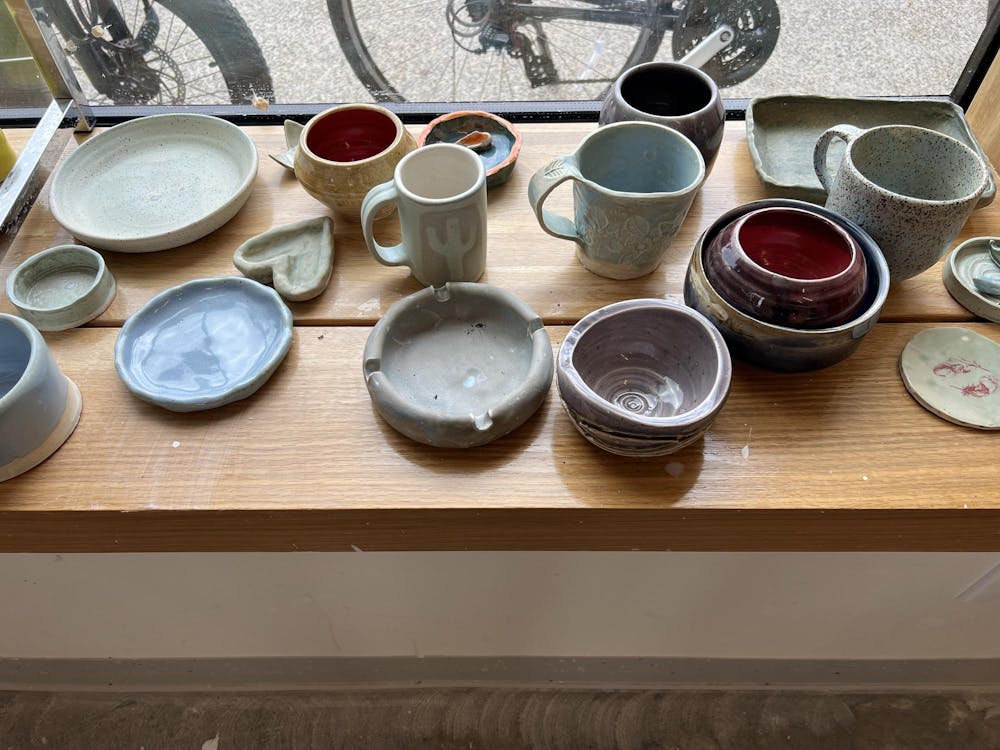There’s only one place on Princeton’s campus where you can create a realistic, full scale representation of Stitch from the Disney movie ‘Lilo & Stitch.’ Or, perhaps you’re more interested in spinning up a mug decorated with sculpted mushrooms, an artistic model of a face, or a homemade gift for a friend. Whatever your creative desires may be, the New College West Ceramics Studio — located across from the Addy Hall Coffee Club — can serve as an outlet.
The new studio opened in the spring of 2023, following the completion of the new college buildings, ending a brief hiatus for students looking to throw and craft on campus. There was formerly a ceramics studio in First College, which was demolished in 2022. While the studio cannot be accessed freely due to safety considerations, students of all experience levels can participate in making pottery by attending workshops that are held each week in the afternoons and evenings. The studio holds an average of 13 events a week, which include free workshops and study breaks. The space is also open for class usage. For instance, a material science course visited the workshop and performed clay experiments.
Two main types of workshops are offered for students hoping to learn pottery techniques: wheel throwing and hand building. Wheel throwing, perhaps a more widely known technique, involves spinning a lump of clay on a wheel to form a piece, while hand building involves creating pieces that do not involve a wheel. Students can also participate in a glaze only class, which involves decorating an already finished piece.
The studio manager, Debbie Reichard, helped design the new layout in NCW. Now, she spends her time managing the space, organizing the materials, and training the student associates. For Reichard, the ceramics studio is a place of community. “I really like working with the student employees because we get to know each other pretty well,” said Reichard. “It’s interesting to see how they develop in ceramics, but also all the other interesting things that are going on in their lives.”
The student studio associates also shared their experiences running workshops. According to studio associates, workshop participants shouldn’t hope to proudly display their first creation — in fact, they may leave their first workshop empty handed. “We embrace ‘non-attachment’ in the studio because, throughout the process, there’s so many places that things can go wrong,” said studio associate Paige Walworth ’26. For beginners still mastering the technique, pieces can easily collapse or become distorted in the spinning process. However, according to Studio Associates like Walworth, students make quick progress and begin developing viable pieces if they keep returning. “I really like seeing when people come in several times, and they’re just really committed to getting it down. You can see the moment where something clicks within them. And then they really start making a lot of progress from there,” Walworth said.
Walworth is the head Audience editor for the ‘Prince.’
Studio associate Bridgette Schafer ’24 also advised the allowance of both creativity and patience in the studio, a theme that seems to ring through all of Princeton’s student workshops. “I constantly just walk around the studio and look at the shelves of projects people are working on to find inspiration,” Schafer said, explaining both the artistic and communal energy that the studio creates. While Schafer feels the artistry around her in the studio, she, too, recognized the difficulties that new ceramicists face in the studio. “I think a lot of people come in thinking they’re going to come out with an item that they’re going to drink their coffee out of the next day. And it’s a way more intensive process than that,” she joked. Instead, Schafer recommends that students “keep coming back and keep trying because you get way better as you continue practicing. Patience, persistence.”
Like Walworth and Schafer, Reichard mentioned that students should be prepared to accept failures along the way. “If anything goes wrong, you always blame it on the clay,” she said. However, Reichard also offered some practical advice for students considering signing up for a workshop.
“My biggest pet peeve,” she said, “the no shows.” Since students often fail to show up to their assigned sessions, she recommended that “if [a student] is on a waiting list, they can show up and, with permission, they might be able to stay.”
If you’re interested in the Ceramics Studio, you can visit My Princeton U to register for a free workshop held in the NCW Studio. Workshops are only available to undergraduate students.
Isabella Dail is a member of the Class of 2026 and head editor for The Prospect at the ‘Prince.’ She can be reached at id7289@princeton.edu.
Please send corrections to corrections[at]dailyprincetonian.com.









